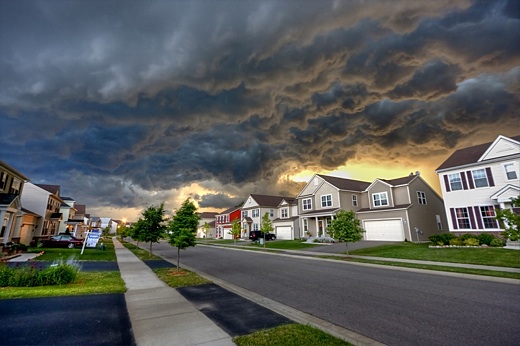 Image above: "Stormy Friday Part II" by Mark Teskey. From (http://t3imagery.com/topics/weather).
Image above: "Stormy Friday Part II" by Mark Teskey. From (http://t3imagery.com/topics/weather).
By Guy McPherson on 20 May 2010 in Nature Bats Last - (http://guymcpherson.com/2010/05/batten-down-the-hatches)
If you’re indebted to the federal government and its evil twin the industrial economy for your financial well-being or, like most Americans, for your very survival, the coming storm will not resemble a monsoon so much as a hurricane-style downspout. And of course it will come as a total surprise to the typical neoclassical economist, who has declared the recession over (and hasn’t recognized that the recession has been replaced with an ongoing depression that will be replaced by complete economic collapse). The industrial economy is circling the drain, and a hard rain is on the way.
I’ve been writing about the ongoing collapse for a few years, and have developed a comprehensive set of arrangements to deal with its ultimate endpoint. At first, I was deemed insane. Then fringe. Suddenly, collapse has gone mainstream. I’m not such a whack job after all, if recent news is any indication. This post provides a brief and partial overview of the dire straits facing the industrial economy age.
Let’s start with the housing market, on which the U.S. economy depends for economic growth. The last time the housing bubble popped, it rocked our suburban world. So the federal government blew up the bubble again, and it just might bring down the entire industrial economy when it pops anew.
Then there’s sovereign debt. Currently, Greece is the primary concern of most economists. That alone should tell you the irrelevance of Greece. The entire Eurozone teeters on the brink, with Greece being one of the few countries of such minor economic significance that it can be bailed out. Japan — the world’s second largest economy — could easily be next in line. And Greece’s debt to GDP ratio is downright tiny compared to that of the U.S. (112% vs. 421%, respectively), suggesting that the U.S. economy could take the Grecian route in the blink of an eye. The only difference between Greece and the U.S. is a printing press, and that alone cannot keep the U.S. from following Greece’s lead. Add to the world economic woes that 49 of 50 U.S. states are underwater, which hardly bodes well for entities that cannot go deeper into debt by printing money to kick the can down the road. The end of fiat currency looms large.
The American stock markets are about to go over the edge. A major crash lies right around the bend, as the entire industrial world is hitting the wall. The government stimulus is about used up, and China is ridding itself of fiat currencies and opting for gold instead (a move that could destroy the world’s industrial economy all by itself). Four big banks rule the American financial world and they keep getting bigger, but I doubt they can keep the show going much longer, even though they can essentially print their own money today (they borrow from the U.S. government at zero interest, and loan it back at three percent or more).
In short, the panic is on. The collapse of industrial society is imminent. Even Ben Bernanke is getting scared as the ultimate Ponzi scheme nears its end.
Among the more important issues we face: The industrialized world cannot live without deepwater oil, and the living planet cannot live with deepwater oil and its side-effects. This seems like a no-brainer to me, and the White House is covering up the extent of the gusher, but few people agree that the living planet on which we depend for our own survival should be a high priority. I’m a big fan of hastening the empire’s decline, if only for the selfish reason of saving our species.
Call me silly. But I think we’re on the verge of killing the beast.
How do industrial humans survive the coming storm? Or do we?
.
No comments :
Post a Comment